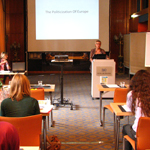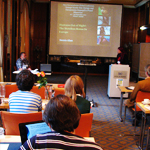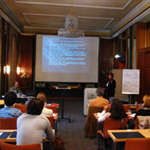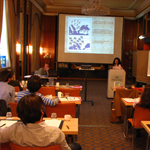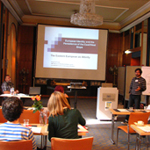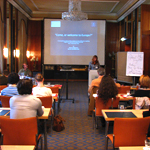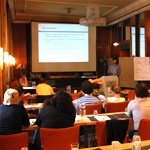Euroacademia Conferences
 Europe Inside-Out: Europe and Europeanness Exposed to Plural Observers (9th Edition) April 24 - 25, 2020
Europe Inside-Out: Europe and Europeanness Exposed to Plural Observers (9th Edition) April 24 - 25, 2020 Identities and Identifications: Politicized Uses of Collective Identities (9th Edition) June 12 - 13, 2020
Identities and Identifications: Politicized Uses of Collective Identities (9th Edition) June 12 - 13, 2020 8th Forum of Critical Studies: Asking Big Questions Again January 24 - 25, 2020
8th Forum of Critical Studies: Asking Big Questions Again January 24 - 25, 2020 Re-Inventing Eastern Europe (7th Edition) December 13 - 14, 2019
Re-Inventing Eastern Europe (7th Edition) December 13 - 14, 2019 The European Union and the Politicization of Europe (8th Edition) October 25 - 26, 2019
The European Union and the Politicization of Europe (8th Edition) October 25 - 26, 2019 Identities and Identifications: Politicized Uses of Collective Identities (8th Edition) June 28 - 29, 2019
Identities and Identifications: Politicized Uses of Collective Identities (8th Edition) June 28 - 29, 2019 The European Union and the Politicization of Europe (7th Edition) January 25 - 26, 2019
The European Union and the Politicization of Europe (7th Edition) January 25 - 26, 2019 7th Forum of Critical Studies: Asking Big Questions Again November 23 - 24, 2018
7th Forum of Critical Studies: Asking Big Questions Again November 23 - 24, 2018 Europe Inside-Out: Europe and Europeanness Exposed to Plural Observers (8th Edition) September 28 - 30, 2018
Europe Inside-Out: Europe and Europeanness Exposed to Plural Observers (8th Edition) September 28 - 30, 2018 Identities and Identifications: Politicized Uses of Collective Identities (7th Edition) June 14 - 15, 2018
Identities and Identifications: Politicized Uses of Collective Identities (7th Edition) June 14 - 15, 2018
Papers
Paraphrasing The Democracy In European Union’ Terms
European Union today stands on her continent as one of the most amazing human projects of the world. At the same time Europe, as the cradle of modern democracies has long been laid herself open to criticisms about the democratic deficit in this European Union.The Politicization Of Europe: The Emergence Of An European Ideology
The European documents are standardized as criteria and they generate politicized values especially in the candidate countries for membership in the EU. This situation, without established solutions in practice, generates a phenomenon of creating an ideology of the EU.Humans Out Of Sight: Stateless Roma In The European Union: 1990-2010
Rather than the conceptually illusive foreigner, across time and space, Romani people were seen to embody what is alien and different. On their sudden arrival in the 14th and 15th centuries, the Roma were perceived by Europe, that was only just beginning to come under state organization and control, as alarming intruders, nomads without hearth or territory, and soon encountered distrust and rejection.The Notion Of European Cinema: Nesting The Otherness
The concern of this paper is to analyse the construction and representation of Europe through the notion of the European Cinema offering the survey of its multiperspective and encompassing definitions. The notions of the European Cinema- understood as the exponent of the European (Cultural) identity – derive from twofold process.European Identity Policy: Ways Of Formation
The story of the unsuccessful adoption of the European Constitution from the political perspective and the latest financial crisis and namely crisis of Euro zone and the economic situation in particular countries of the European Union (so called “PI(I)GS”) demonstrated a menace for the future of the European project.Sceptical Images Of The European Union. Euroscepticism Of Turkish University Students
This study explores how Euroscepticism is [re]produced among a group of university students in the context of historical interpretations of European history and the image of EU. The data for this study was collected during a fieldwork conducted between 20 September 2006 and 1 June 2007 with a group of graduate students from Ankara University and Middle East Technical University in Ankara, Turkey.Europe And Its “Accursed“ Share
Once upon a time, in the middle eighties of Romania (before the ’89 revolution) one of the Romanian intellectuals ended up in the postmodern liberal capitalist country of Austria – more concretely in an Austrian mall. His greatest shock was not related to the abundance of goods and needs, but rather to the gift of free plastic bags.The European Identity And The Persistence Of The East/West Slope
The Eastern Enlargement took place within a framework of deeply asymmetric relations between the EU and the candidate countries (Moravcsik and Vachudova 2003). A robust theory of enlargement explains the interests driven determination of Central and Eastern European countries to join while they entrapped through strategic action the Western European side of the EU in its rhetoric of commitment to norms and values as inescapable arguments to enlarge (Schimmelfennig 2003; Schimmelfennig and Sedelmeier 2005).“Come, Or Welcome To Europe?” A Comparative Analysis Of The Inside-out Views Of Russian-Speaking Migrants In Selected European Countries
After the dissolution of the Soviet Union, many Russian-speaking migrants found it attractive to move to European countries such as Germany and Norway as a result of different push- and pull-factors, expecting to find a friendly environment and a new home.Entrare In Europa: Consensus And Transformation In Italian Capitalism
The aim of this paper is to analyze the moment of consensus within the Italian political economy that corresponded to the signing of the Maastricht treaty in 1992. In the following year, the social partners signed a tripartite agreement with the government that aimed at allowing Italy to respect the Maastricht criteria and thus joining the first group of the Eurozone, which it did at the end of the decade.


